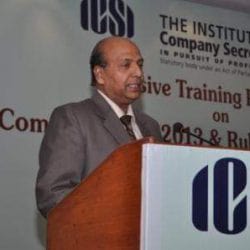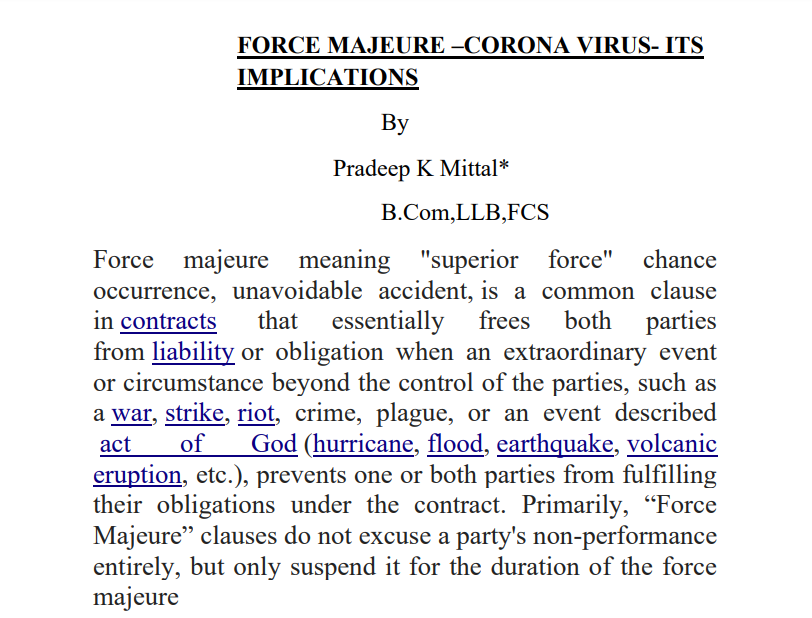FORCE MAJEURE –CORONA VIRUS- ITS IMPLICATIONS
FORCE MAJEURE –CORONA VIRUS- ITS IMPLICATIONS
Force majeure meaning “superior force” chance occurrence, unavoidable accident, is a common clause in contracts that essentially frees both parties from liability or obligation when an extraordinary event or circumstance beyond the control of the parties, such as a war, strike, riot, crime, plague, or an event described the act of God (hurricane, flood, earthquake, volcanic eruption, etc.), prevents one or both parties from fulfilling their obligations under the contract. Primarily, “Force Majeure” clauses do not excuse a party’s non-performance entirely, but only suspend it for the duration of the force majeure.
2: “Force Majeure” is generally intended to include occurrences beyond the reasonable control of a party, and therefore would not cover:
(a): Any result of the negligence or malfeasance of a party, which has a materially adverse effect on the ability of such party to perform its obligations.
(b): Any result of the usual and natural consequences of external forces.
2.1: Definitely, in the light of the above definition, where there is a complete lock-down clamped by the Government of India where each and every activity (be Industry, Trade, Commerce, Business and even social) came to a grinding half and nothing is moving hence this situation, undoubtedly would fall within the realm of “Force Majeure”
BINDING NATURE OF CONTRACT:
3: The Supreme Court in Bharathi Knitting Company v. DHL Worldwide Express, MANU/SC/0628/1996 has observed thus:
It is seen that when a person signs a document that contains certain contractual terms normally parties are bound by such a contract; it is for the party to establish exception in a suit. When a party to the contract disputes the binding nature of the signed document, it is for him to prove the terms, In the contract or circumstances in which he came to sign the documents need to be established.
FORCE MAJEURE DEFINED
4: In Matsoukis v. Priestman and Co. (1915) 1 K.B. 681 Mr. Justice Bailhache opined “force majeure” as meaning “causes you cannot prevent and for which you are not responsible” a definition which would certainly include the inability to obtain tonnage owing to war conditions prevailing in the port or ports from which the goods were to be dispatched. In his opinion “force majeure” would include strikes and break-down of machinery but not bad weather.
A CLAUSE IN CONTRACT A MUST
5: The English Common does not automatically apply force majeure principles to contracts. Parties to English law contracts who wish to have force majeure relief must spell out what constitutes force majeure in the contract itself and there must be a specific clause in the said Contract. In the event of failure to provide for a clause, it will not relieve the party against consequences.
6: When force majeure has not been provided for in the contract (or the relevant event does not fall within the scope of the force majeure clause), and a supervening event prevents performance, it will be a breach of contract and the defaulting party shall be pay damages under Section 73 and 74 of Indian Contract Act, 1872. However, upon the occurrence of the Force Majeure, the defaulting party wishing to avail the benefit, must write to the other party seeking to invoke the provisions of “Force Majeure” as provided under Contract – otherwise, the defaulting party shall not be entitled to such benefits.
7: The Full Bench of Sindh High Court in the case of Husseinbhoy Karimji Vs. Ramdas Morarji MANU/SN/0053/1926 has observed as under:-
The Sugar Association decided to adopt or to recognize the force majeure clause, and some dealers acted on the assumption that it would be enforced. Obviously, therefore, the force majeure clause is a term of all the contracts entered into after the resolution was passed. But I cannot hold that others who had dealt in sugar before July, in ignorance of the force majeure clause, can be held to be bound in respect of those contracts, unless, it can be held that the attitude taken up by the Sugar Association is evidence that they knew that sugar contracts were on indents.
8: Therefore, it is manifestly clear that the party can take advantage of “force majeure” when the clause of “force majeure” is a part and parcel of the Agreement – agreement may be oral or in writing.
9: In re Dharnrajmal Gobindram v. Shamji Kalidas [All India Reporter 1961 Supreme Court (of India) 1285], it was held, while defining the scope of “Force Majeure” that, where the intention is to save the defaulting party from the consequences of anything over which he had no control.”
10: The law of frustration will be the sole remaining course available to the party in default to end the contract as provided under Section 56 of Indian Contract As, 1872.
Section 56: An agreement to do an act impossible in itself is void:
10.1: Where on account of the war, there is an abnormal increase in price, the contract is frustrated for this is an untoward event or change of circumstances which totally upset the very foundation upon which the parties rested their bargain as has been held in Easun Engineering Co Ltd Vs. Fertilizers & Chemicals Travancore Ltd AIR 1991 Mad 158
WHEN THERE IS NO CLAUSE FOR PRICE INCREASE
12: The Supreme Court in Tarapore & Company v. Cochin Shipyard Ltd., MANU/SC/0002/1984 observed that “if rate initially quoted by the contractor became irrelevant due to subsequent price escalation, it was held in that case that contractor’s claim for compensation for the excess expenditure incurred due to the price rise could not be turned down on the ground of absence of price escalation clause in that regard in the contract. The agreement as a whole has to be read.
Download the copy:
If you already have a premium membership, Sign In.
 Advocate Pradeep Kumar
Advocate Pradeep Kumar
PK Mittal BCom Delhi university 1975 LLB Delhi University 1978 FCS Fellow Member of ICSI 1992 1982 to 1992 as CS in Corporate Head Legal Apollo Tyres Ltd 1986 to 1992 1993 onwards Advocate in Delhi High Court CESTAT NCLT = Practcising Indirect Tax and Corporate laws 1993 to till date. Written more than 100 Article on Company Law and Corporate laws Indirect Tax Speaker on Indirect Tax Co Law and IBC in various Seminars Workshop organised by ICAI ICSI and ICMA and other organisations Convenor Core Group on GST of ICSI













